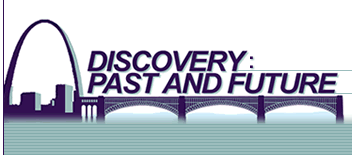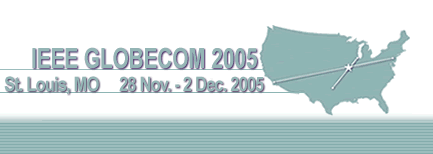





















|
Communication Theory Symposium Chair and Vice-Chairs · Chintha Tellambura, University of Alberta, Canada, chintha@ece.ualberta.ca · Sarah Kate Wilson, USA, kate.wilson@stanfordalumni.org Scope The IEEE GLOBECOM 2005 Communication Theory Symposium will be held in St. Louis, Missouri. This symposium welcomes original research in the general areas of wireless, mobile and wire-line communication theory. In particular, papers related to the topics-of-interest listed below are warmly encouraged. For details about submission deadline, paper format, and on-line submission procedure please see the main GLOBECOM 2005 page. Authors should include at least one of the topics-of-interest below when submitting a paper. Topics of interest: |
|
· Adaptive Antenna Arrays · Adaptive modulation · Analysis of Wireless Systems · CDMA and Spread Spectrum · Coded Modulation · Coding and Signal Processing For Storage · Coding Theory and Practice · Communication System Analysis · Communication Theory in Sensor Network · Cooperative Diversity and Relay Channels · Cross Layer Optimization · Detection and Estimation · Diversity and Fading countermeasures · Equalization, Interference Cancellation and Signal Separation |
· Information Theory · Integrated Design of Physical and Higher Layers · Iterative Receiver Techniques · Multicarrier Systems and OFDM · Multiple Access Techniques · Multiple-Input Multiple-Output (MIMO) Systems · Multiuser Detection · Multiuser Diversity · Power Control Algorithms and analysis · Signal Processing for Communications · Space-Time Coding and Processing · Synchronization · Turbo and LDPC Codes · Ultra-Wideband Radio |
|
Technical Program Committee (in alphabetical order) ·Valentine Aalo, Florida Atlantic University ·Naofal Al-dhahir, U of Texas at Dallas ·Slim Alouni, University of Minnesota ·Jeff Andrews, University of Texas at Austin ·Steve Bates, University of Alberta ·Norman Beaulieu, University of Alberta ·Helmut Boelcskei, Swiss Federal Institute of Technology ·Jim Cavers, Simon Fraser ·Len Cimini, University of Delaware ·Tolga Duman, Arizona State University ·Ivan Fair, University of Alberta ·Bernard Fleury, Aalborg University ·Dennis Goeckel, University of Massachussets ·Cyril Iksander, Florida Atlantic University ·Amir Khandani, University of Waterloo ·Jim Krogmeier, Purdue ·Lutz Lampe, University of British Columbia ·Erik Larsson, George Washington University ·Jungwon Lee, Marvell Semiconductor, USA ·Tiffany J. Li, Lehigh University ·Ye (Geoffrey) Li, Georgia Tech ·Tat M. Lok, University of Hong Kong ·Hui-ling Lou, Marvell Semiconductor ·Marco Luise, University of Pisa ·Ranjan Mallik, Indian Institute of Technology-Delhi ·Hlaing Minn, University of Texas at Dallas ·Wai Ho Mow, Hong Kong University of Science & Technology |
·Rohit Negi, Carnegie-Mellon ·Joe Nowack, Motorola Labs ·Hideki Ochiai, University of Electro-Communications, Tokyo ·Björn Ottersten, Royal Institute of Technology ·Roger Peterson, Motorola Labs ·Nandana Rajatheva, Asian Institute of Technology ·Dinesh Ranjan, Southern Methodist University ·Akbar Sayeed, University of Wisconsin-Madison ·Robert Schober, University of British Columbia ·Alireza Seyedi, Phillips Research, USA ·Mikael Skoglund, Royal Institute of Technology ·Murat Uysal, University of Waterloo ·R. Viswanathan, S. Illinois University ·Giorgio Vitetta, University of Modena & Reggio Emilia ·Zhengdao Wang, Iowa State University ·Rick Wesel, University of California, Los Angeles ·Aylin Yener, Pennsylvania State University ·Q.T. (Keith) Zhang, City University of Hong Kong ·Fu-Chun Zheng, Victoria University - Australia |